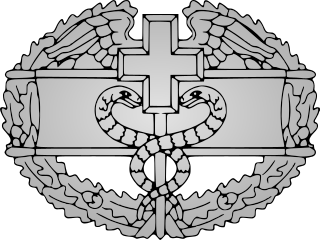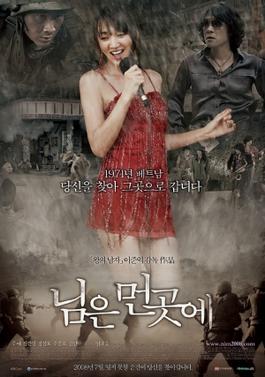
The Purple Heart (PH) is a United States military decoration awarded in the name of the president to those wounded or killed while serving, on or after 5 April 1917, with the U.S. military. With its forerunner, the Badge of Military Merit, which took the form of a heart made of purple cloth, the Purple Heart is the oldest military award still given to U.S. military members. The National Purple Heart Hall of Honor is located in New Windsor, New York.

A Vietnam veteran is an individual who performed active military, naval, or air service in the Republic of Vietnam during the Vietnam War.

The Tomb of the Unknown Soldier is a historic funerary monument dedicated to deceased U.S. service members whose remains have not been identified. It is located in Arlington National Cemetery in Virginia, United States. The World War I "Unknown" is a recipient of the Medal of Honor, the Victoria Cross, and several other foreign nations' highest service awards. The U.S. Unknowns who were interred are also recipients of the Medal of Honor, presented by U.S. presidents who presided over their funerals. The monument has no officially designated name.
An Amerasian may refer to a person born in Asia to an Asian mother and a U.S. military father. Other terms used include War babies or G.I. babies. Other persons of such ancestry may have mothers in the U.S. military or have Amerasian ancestry through their grandparents, and so on.

The 25th Infantry Division is a United States Army division based at Schofield Barracks in Hawaii. The division, which was activated on 1 October 1941 in Hawaii, conducts military operations primarily in the Asia-Pacific region. Its present deployment is composed of light infantry and aviation units. Tropic Lightning soldiers regularly train with other U.S. military branches to practice and maintain joint operations capabilities. The climate and terrain of the Pacific region demands Tropic Lightning soldiers be able to operate in physically demanding and harsh environments. In 2014, the division opened the Jungle Operations Training Center—the first such school in the Army since the closing of the old Jungle Warfare School at Fort Sherman, Panama Canal Zone. Joint operations and training with partner states herald a new chapter in the history of Tropic Lightning—America's Pacific Division.

The Combat Infantryman Badge (CIB) is a United States Army military decoration. The badge is awarded to infantrymen and Special Forces soldiers in the rank of colonel and below, who fought in active ground combat while assigned as members of either an Infantry or Special Forces unit of brigade size or smaller at any time after 6 December 1941. For those soldiers who are not members of an infantry, or Special Forces unit, the Combat Action Badge (CAB) is awarded instead. For soldiers with an MOS in the medical field they would, with the exception of a Special Forces Medical Sergeant (18D), receive the Combat Medical Badge. 18D Special Forces Medics would receive the Combat Infantryman badge instead.

The Combat Medical Badge is an award of the United States Army which was first created in January 1945. Any member of the Army Medical Department, at the rank of colonel or below, who is assigned or attached to a ground combat arms unit of brigade or smaller size which provides medical support during any period in which the unit was engaged in ground combat is eligible for the CMB. According to the award criterion, the individual must be performing medical duties while simultaneously being engaged by the enemy; strict adherence to this requirement and its interpretation will vary by unit. As of 3 June 2005, Special Forces medics are no longer eligible for award, but may now receive the Combat Infantryman Badge. A revision has allowed aviation medics to be eligible for the CMB. The non-combat proficiency equivalent is the Expert Field Medical Badge.

R-Point is a 2004 South Korean psychological horror war film written and directed by Kong Su-chang. Set in Vietnam in 1972, during the Vietnam War, it stars Kam Woo-sung and Son Byong-ho as members of the South Korean Army in Vietnam. Most of the movie was shot in Cambodia. Bokor Hill Station plays a prominent part of the movie, in this case doubling as a French colonial plantation. In 2011, Palisades Tartan re-released this film on DVD under the title Ghosts of War.

The 24th Infantry Regiment is a unit of the United States Army, active from 1869 until 1951, and since 1995. Before its original dissolution in 1951, it was primarily made up of African-American soldiers.
Ahn Junghyo was a South Korean novelist and literary translator.

Members of the U.S. Army Special Forces will emphatically assert that the "Green Beret" is a hat and not the man who wears it. Nevertheless, for a time in the 1960s the Green Berets and the men who wore them became a national fad emerging in a wide variety of popular culture referents. After a decline in popularity during the 1970s — coinciding with the American public's backlash against the Vietnam War — the Green Berets gripped the popular imagination again beginning with the Rambo film franchise in 1982. They continue to appear as both major and minor referents in popular culture — especially in movies and television — often serving as a shorthand signifier for a shady or covert military background for a fictional character. As a dramatic device, this can cut both ways — i.e., lead an audience to either admire or fear a character.
Anthony B. Herbert was a United States Army officer, who served in both the Korean War and the Vietnam War. He is best known for his claims that he witnessed war crimes in Vietnam, which his commanding officer refused to investigate. He reached the rank of lieutenant colonel and was the author of several books about his experiences, including Soldier and Making of A Soldier.
Lai Đại Hàn, sometimes Lai Daihan or Lai Tai Han, is a Vietnamese term for a racially mixed person born to a South Korean father and a Vietnamese mother as a result of South Korea's participation in the Vietnam War. Political controversies continue due to the fact that some of the generation were conceived through wartime sexual assault, which is currently unacknowledged by the South Korean government, and due to the unequal and discriminatory treatment they have faced from the Vietnamese government.
Lieutenant Colonel Jack Lewis or C. Jack Lewis USMC retired, was a former Marine, screenwriter, author of 12 books and an estimated 6,000 magazine articles and short stories, He was the co-founder and editor of Gun World magazine and continued contributing articles to that publication until the time of his death. Lewis wrote under the name C. Jack Lewis due to four other writers with the name of Jack Lewis.

Sunny is a 2008 South Korean film directed by Lee Joon-ik. Soo Ae plays the titular Soon-yi, whose husband enlists to fight in the Vietnam War, and she decides to join a singing group that will travel to Vietnam to perform for the soldiers there.

Many films, books, and other media have depicted the 1950—53 Korean War. The TV series M*A*S*H is one well known example. The 1959 novel The Manchurian Candidate has twice been made into films. The 1982 film Inchon about the historic battle that occurred there in September 1950 was a financial and critical failure. By 2000 Hollywood alone had produced 91 feature films on the Korean War. Many films have also been produced in South Korea and other countries as well.

South Korea and Vietnam established formal diplomatic relations on 22 December 1992, though the two countries had already had various historical contacts long before that. According to Vietnamese Prime Minister Phan Văn Khải, "The Republic of Korea is a very important partner of Vietnam and a good model for Vietnam to expand cooperation and exchange experiences during its development process." On 2022, South Korea and Vietnam upgraded their relationship in to "comprehensive strategic partnership", became the fourth country after China, Russia and India to do so.
The South Korean government, under the regime of Park Chung Hee, took an active role in the Vietnam War. South Korea's decision to join resulted from various underlying causes, including the development of US-South Korea relations, political exigencies, and the promise of economic aid from the United States. From September 1964 to March 1973, South Korea sent some 350,000 troops to South Vietnam. The South Korean Army, Marine Corps, Navy, and Air Force all participated as an ally of the United States. The number of troops from South Korea was much greater than those from Australia and New Zealand, and second only to the U.S. military force for foreign troops located in South Vietnam. The military commander was Lieutenant General Chae Myung-shin of the South Korean army. Participation of Korean forces in the war included both non-combatant and combatant roles.
Kong Su-chang is a South Korean film director and screenwriter. Kong started as a screenwriter and is behind hits such as White Badge (1992), The Ring Virus (1999) and Tell Me Something (1999). He debuted with the military-themed R-Point (2004), and then The Guard Post in 2008.

Rape during the Vietnam War, as well as other acts of wartime sexual violence, was committed against Vietnamese civilians by military personnel from the United States, South Korea, and other combatants. According to American academic Elisabeth Jean Wood, wartime rape was frequently committed by U.S. troops because their commanders tolerated them. Weaver stated that not only were documented crimes against Vietnamese women by United States military personnel ignored during the international legal discourse which occurred immediately after the war, but modern feminists and other anti-war rape campaigners, as well as historians, have continued to dismiss them.













